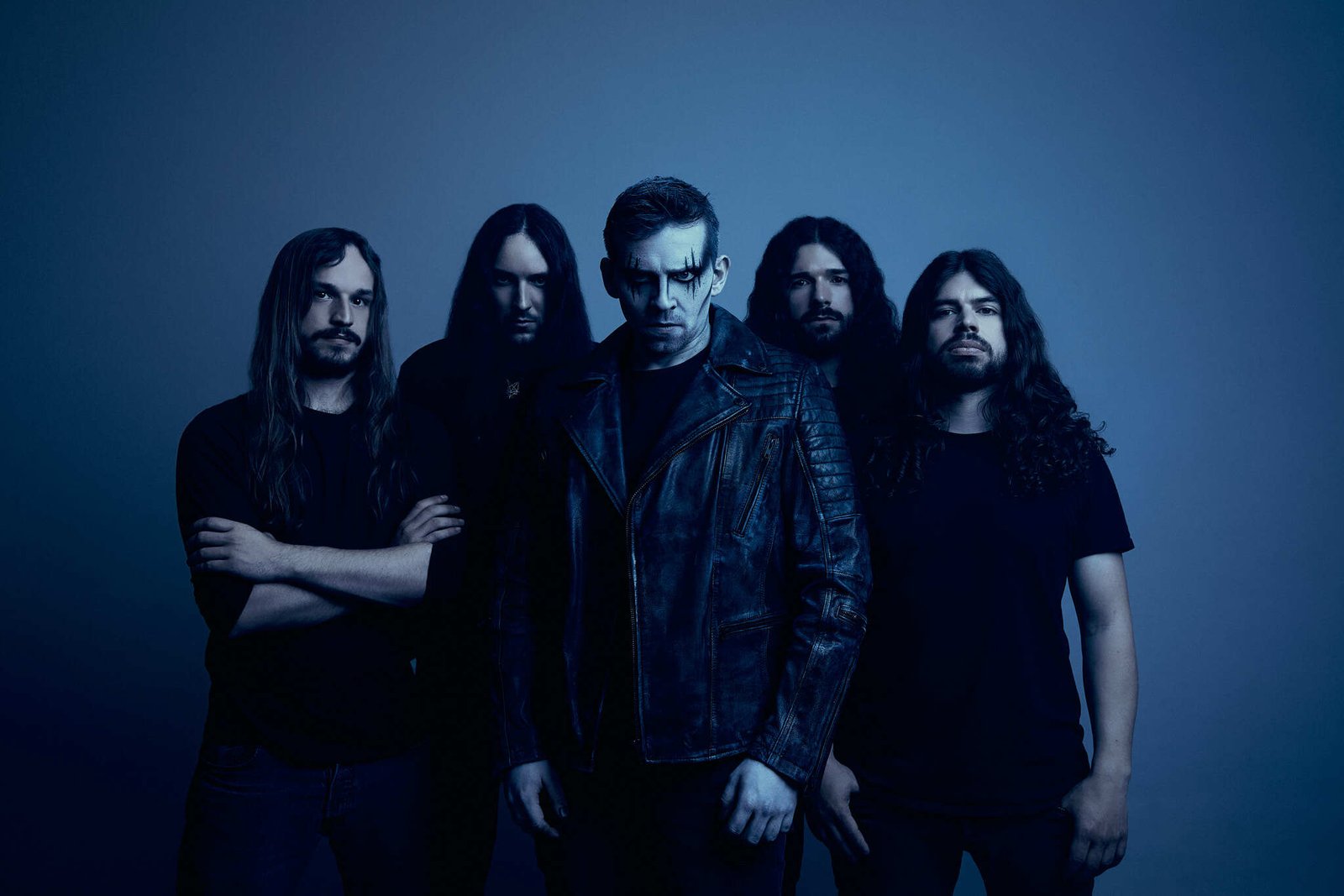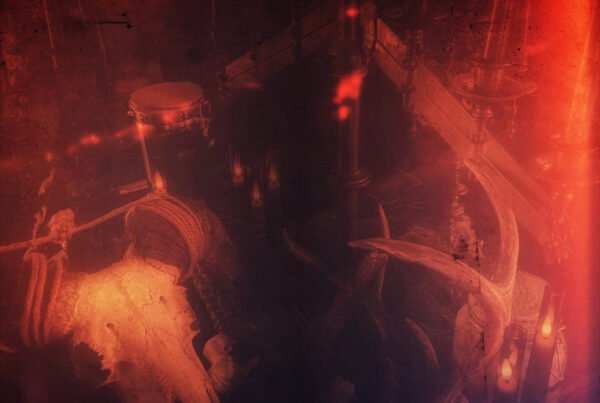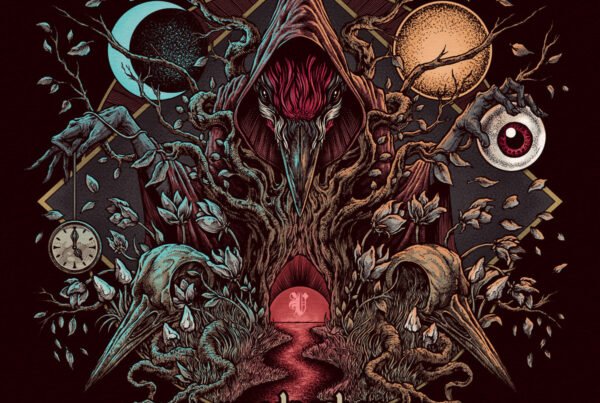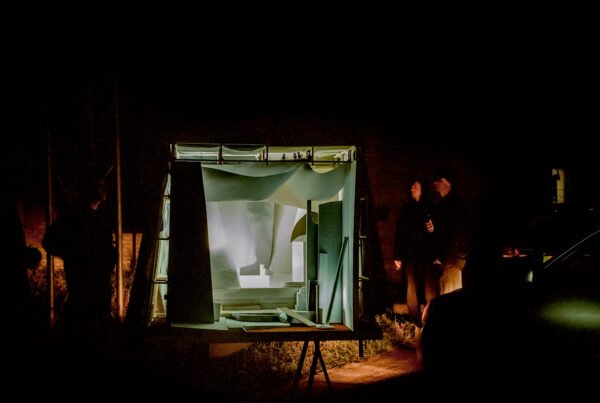Death metal revival stalwarts Carnation return with Cursed Mortality, an album that reasserts their dominance while lighting their path forward.
Release date: November 3, 2023 | Season of Mist | Facebook | Bandcamp
When it comes to sheer nostalgia, few genres can beat out revivalist death metal. For probably a decade and a half now, we’ve been blessed with those sepulchral, vintage riffs from all corners of the world on a weekly basis. Sometimes they come with that beloved Swedish HM-2 crust, sometimes they bear the damp aroma of Floridian swamps, and sometimes they roll along like an old British tank. A lot of great bands have come from that movement, and Belgium’s Carnation has become of my own personal favorites. After two sublimely pummeling and unabashedly old school albums paying particular tribute to the Swedish scene, my hype was high when the band announced their new album, Cursed Mortality. The question is simple: have Carnation blessed us with another stellar offering of great old school death metal?
The answer, as it happens, is ‘yes, and…’ As was readily apparent upon announcement, Carnation’s newest album comes with a noticeable shift in approach and attitude manifesting in a more progressive, diverse sonic palate from the very start. “Herald of Demise” doesn’t burst out like a chainsaw to the ears, but rather rolls in with a foggy ambiance and synthy subtext you’d expect more from a late 90’s symphonic black metal album. And then the band slams you to the floor with an Entombed-esque assault, continuing onward balancing that side with charging, regal leads and a slick guest solo from Andy LaRocque (of King Diamond fame). Later on, the song “Replicant” leads off with clean vocals over relatively calm, melodic passages, trading off with sections of heavy, riffy ballast. Album closer (and de facto centerpiece) “Cursed Mortality” leans even harder on cleans, synths, and a more atmospheric, progressive feeling, and closes the album on an oddly emotive note for what is ostensibly an old school death metal album.
That down and dirty classic side of the equation, it needs to be said, is still handled expertly. “Maruta” kicks in with all the d-beat-driven fury you could ever want from a band inspired by the Stockholm scene. Songs like “Dutroux” and “Cycle of Suffering”, likewise, are brimming with sharp and choppy riffs. And “Submerged in Deafening Silence” even brings in a doomy creep to the bludgeoning proceedings, maintaining the omnipresent atmosphere the album evokes. Picking a particular point of comparison, much of the album’s more conventional moments call to mind Bloodbath. Specifically, the dark and somewhat spooky lead lines that band wove throughout albums like The Fathomless Mastery echo through the moodier riffing on this album. The rest, of course, is pure crunchy goodness.
On that note, it has to be mentioned that the production of this album is absolutely massive. The tone of the guitars is full and given plenty of room in the mix, the drums feel clear and organic, and the vocals remain central in the mix, which in this band’s case is only a good thing. The bass is regrettably a little quiet in the mix, but it does emerge in slower moments to great effect. Synths, where applicable, are always audible but never hijack the mix from the band, and add an excellent flavor to the proceedings.
It also helps that the album’s cover, from the late, great Mariusz Lewandoski, is an absolute beauty and one of his more understated works. Carnation’s new logo is slick, and does a nice job signposting the band’s changed approach. It also feels fair to praise the band for mixing up their lyrical styling in some pretty tasteful ways. Sure, some classic death metal tropes are still apparent on tracks like serial killer account “Dutroux” or the Unit 731-themed “Maruta”. But the band likewise pays tribute to classic cinema in “Metropolis” and “Replicant”, which I am a sucker for. “Cycle of Suffering” is a genuinely thoughtful take on drug addiction for a death metal group, and the closing title track is a moving meditation on death. Of course, it helps that all of these themes are given voice by one of the best in the business in Simon Duson, whose cavernous Dan Swanö-esque roar is just perfect. His cleans will likely be a little more controversial among genre purists, but this humble reviewer finds them a fine addition to the band’s sound.
For all the new ingredients to Carnation’s sound here, it does seem like Cursed Mortality is more of a half-step towards a new style than a great leap. Previous album Where Death Lies did have moments with more synth presence and atmospheric effects pointing towards the band’s ambitions outside the confines of the old school death metal paradigm. A majority of this album still plays it pretty straight, stylistically. And again, Carnation does that sound better than most. Cursed Mortality totally succeeds at what it’s doing, but it does feel like the promise to wilder things yet to come is always hanging around the album’s periphery. Still, for a tight 35 minutes, Cursed Mortality is packed to the gills with great material, and does set Carnation up for a move to more diverse sound that’s a little less Entombed and a little more Edge of Sanity.
Carnation didn’t need to change for me to keep loving them. Their first two albums are some of my favorites in the modern scene, and it’s obvious the band could still absolutely succeed in that lane. But Cursed Mortality really feels like the band is ready to step outside of being a great Stockholm-style death metal revival band and become a genuinely different, more unique death metal group. There’s still savage riffs in spades here, but there’s also a more serious, thoughtful air to the proceedings this time. The inherent brutal fun of their sound has been rendered in darker, deeper hues, and it’s very exciting to consider where the band may go next. Mortality may truly be our haunting curse, but on the strength of their work so far and especially here, I’m hoping Carnation has a long and fruitful life ahead.
Artist Photo by Gaëlle Spaas






